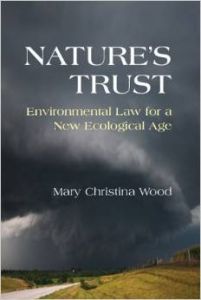The following is an an excerpt from Mary Christina Wood’s book Nature’s Trust: Environmental Law For a New Ecological Age.
“The last time we saw anything like this was never….I don’t know how to say it any clearer than that it is the largest threat to human life our state has experienced in anyone’s lifetime.” Connecticut Governor Dannel Malloy, remarks in response to Hurricane Sandy’s approach, October 28, 2012[1]
As climate vengeance strikes communities with greater frequency and horrifying intensity, citizens across the planet now bear witness to the lethal consequences of humanity’s industrialized path. Yet environmental law, society’s major instrument to impart ecological responsibility, does little to bring human actions into compliance with nature’s laws – the laws that really count. In fact, environmental regulation hastens this course of disaster.
Arising primarily from statutes passed in the 1970s, the field of environmental law stands as a failed legal experiment. The administrative state vests agencies with breathtaking power that came justified by one simple assumption: officials will deploy public resources and invoke their technical expertise on behalf of the public interest. Instead, too many environmental agencies today use their power to carry out profit agendas set by corporations and singular interests. As Part I of this book explained, environmental agencies have fallen captive to the industries they regulate. Consequently, they use the laws’ permit provisions to legalize the very damage the statutes were designed to prevent. Nearly across the board, environmental statutory processes do not prohibit harm: they permit it.
The problem lies not in the statutes themselves but in the frame governing environmental law. As a political frame, it continually bends agencies into serving those parties holding the most political power, which in today’s world often means corporations rather than the general public. In many US agencies, decisions flow from what the politics will allow, not what the statutes say. High-ranking political operatives use their discretion to favor the industries they continue to serve from inside the agency. Staff scientists and permit writers operating within highly charged political cultures suffer varying degrees of pressure to fall in line with the agency’s political agenda. These pressures remain obscured from the public, taking place in procedural fortresses made nearly impenetrable by their sheer complexity.
In a three-branch system of government, courts and legislatures should provide meaningful checks and balances to rein in the executive branch and its agencies. But Congress, more susceptible to corporate influence than ever before, deadlocks over environmental policy. Its minimal involvement typically consists of appropriations riders passed to legalize industry behavior that would otherwise violate statutory mandates. Courts, while positioned to force agency compliance with statutory mandates, play a weak role because of a deference doctrine, which accords agency technical decisions a presumption of validity. Absent effective oversight by the other two branches of government, a dangerous amount of power accumulates in the executive branch, both on the federal and state levels. While legal structures vary considerably among different nations, the untrammeled power of agencies, wherever located, can create an administrative tyranny over nature and a menace to environmental democracy .
Society stands at a crucial moment in time. Actions taken now and in the next few years will determine how well humanity will survive on the planet. Warnings of tipping points, irreversible losses and unpredictable cataclysmic planetary change now pour from the scientific community in growing torrents of alarm.[2] Increasingly, the science makes clear that this moment can be revolutionary, or it can be suicidal. Guiding humanity to a safe ecological path before crossing irrevocable thresholds becomes the most urgent call on Earth.
Humanity cannot hope for a livable planet if government agencies continue to license industries to pollute and destroy the remaining natural resources. Environmental law becomes profoundly relevant to the daily life and future wellbeing of every citizen alive today. In words that now reverberate truth in nearly every nation, Ansel Adams once said: “It is horrifying that we have to fight our own government to save the environment.”[3] Citizens living in all parts of the world stand on common ground as never before, in both their challenge and mission.
This book has developed a paradigm called Nature’s Trust to reconstitute environmental law in countries throughout the world. It calls forth an ancient duty embodied in the public trust doctrine, a legal principle that has flowed through countless forms of government through the ages. At its core, the doctrine declares public property rights originally and inherently reserved through the peoples’ social contract with their sovereign governments. The trust remains an attribute of sovereignty that cannot be alienated by any legislature. This principle designates government as trustee of crucial natural resources and obligates it to act in a fiduciary capacity to protect such assets for the beneficiaries of the trust, which include both present and future generations of citizens. Unlike the permissive bent of administrative discretion under statutory law, the public trust imposes a strict duty to protect the people’s commonwealth. At a time when government actions worldwide threaten to rob today’s youth of an ecologically secure future, the trust breathes legal rights into the aspiration of inter-generational equity.
While the public trust has long offered a theoretical ideal for environmental law, until now it has lacked the precision necessary to apply it to a broad realm of practical conflicts arising before modern legislatures and agencies. This book sought to illuminate a fiduciary path by setting forth the substantive and procedural obligations incumbent on government entities as trustees of public resources. They must protect the trust, not allow waste, maximize the societal value of trust assets, restore assets where they have been damaged and recoup monetary damages from third parties that have injured the assets. Further, a legislature must not alienate public trust assets where doing so would not serve public trust purposes, or would substantially impair the ecological wealth remaining in the trust. These are active duties, leaving no room for idle management. Government’s failure to protect the planet’s climate system on which all life depends amounts to the most dangerous perversion of this fiduciary responsibility.
In terms of procedural duties, the trust dismantles the political frame that warps bureaucratic decision making. Agency trustees hold an unwavering duty of undivided loyalty to the public (both present and future generations) and must abide by the highest “punctilio” of fiduciary care.[4] Those who allow the destruction of natural resources to advance singular and corporate interests, or to serve their own political or bureaucratic interests, act in violation of their duty. In addition, the trust model requires that agencies act in good faith, with reasonable skill, and with due caution for protecting vital assets. These duties re-posture scientific uncertainty and lay the legal ground for a precautionary approach. Rather than providing a ready excuse not to regulate industry behavior, scientific uncertainty compels agencies to disallow pollution, resource destruction, chemical introduction and genetic modification unless and until conclusive proof exists that such practices will not pose harm. This reversal becomes precisely what is needed in a world in which agency safety reviews cannot hope to keep pace with industry’s experimentation.
As a property concept, Nature’s Trust applies to any level, from local to global. Not reliant on legislative enactments, it stands as the only organic, holistic approach to defining government obligation. It characterizes all sovereigns – nations, states and tribes – as co-tenant trustees of shared trans-boundary assets, joined together in a property-based framework of corollary and mutual responsibilities. Their reciprocal obligations include the duty to protect and guard against waste to the common asset.
Extrapolated to a planetary level, the trust offers a model for global responsibility at a time when international law wholly fails to address the world’s most urgent environmental crises.[5] The approach has spawned a legal campaign known as Atmospheric Trust Litigation brought on behalf of children and youth of the world. The litigation seeks to force governments to control carbon pollution in accordance with scientific prescriptions before indolent officials draw the shades on the last window of opportunity to prevent climate catastrophe.
Any trust relies on strong judicial enforcement of fiduciary duties. Without a robust judiciary, there exists no trust – only tyranny. This book devoted a chapter to judicial enforcement, outlining steps that judges could take immediately, within their realm of authority and judicial tradition, to restore integrity to environmental law and enforce the property rights of citizen beneficiaries. It argued for judicial review of legislative action under fiduciary standards of loyalty to the public. It underscored the need for judicial remedies to address the institutional dysfunction of agencies in their management of resources. When faced with long-standing agency incompetence, corruption and dereliction of duty, courts prove effective only by intervening (either temporarily or for protracted periods) directly into the agency’s processes. We also detailed the elements of structural injunctions and described institutional remedies that could promote effective judicial supervision. While these types of remedies have ample precedent and remain well within the realm of equitable authority, courts have not yet used them widely in environmental law.
Today’s judges retain all of the tools necessary to enforce public trust obligations. But enforcement requires courage and a change of judicial mindset, an awakening by judges to the ecological urgencies of today’s world, and an appreciation of their branch’s crucial role in government’s balance of power. The world needs extraordinary jurists across the globe who, in solidarity with great legal minds that came before them, will rise to their constitutional duties and enforce the rights of the people as beneficiaries of Nature’s Trust.
A legal paradigm gains vitality from the shared values of the community and, more fundamentally, from the long-standing expectations of humanity. To a great extent, environmental law has come unmoored from these intuitive anchors. Public trust principles aim to protect future generations, secure natural commonwealth for the public, promote the highest, non-wasteful uses of resources and uphold the right of nature to exist and flourish. Tapping a wellspring of human understanding that remains instinctive, passion-bound and deeply shared among citizens of distant cultures, Nature’s Trust can evoke a moral language to access strong human sensibilities. The same trust principles that flow through a judge’s pen can be preached from a pulpit or spoken as the last words from a grandmother to her grandchildren anywhere in the world – because the trust encompasses a moral covenant that transcends all governments, cultures and peoples on Earth.
NOTES
1 Amy Oliver et al., Breaking News: Superstorm Sandy Finally Makes Landfall as Deadly Front Slams into East Coast with Millions Fearing the Worst , Mail Online (Oct. 30, 2012) (quoting Gov. Malloy).
2 See Stephanie Pappas, Tipping Point? Earth Headed for Catastrophic Collapse, Researchers Warn, Yahoo! News (June 6, 2012).
3 Petition for Original Jurisdiction at 16, Barhaugh v. Mont., No. OP 11–0258 (Mont. May 4, 2011) (quoting Ansel Adams). See also Burns H. Weston & David Bollier, Green Governance: Ecological Survival, Human Rights, and the Law of the Commons 262 (Cambridge U. Press 2013) (“The dysfunctionalities of existing systems of government and law cannot be denied, repressed, or finessed forever.”).
4 Meinhard v. Salmon, 164 N.E. 545, 546 (N.Y. 1928) (“A trustee is held to something stricter than the morals of the market place. Not honesty alone, but the punctilio of an honor the most sensitive.”) (opinion by Justice Benjamin Cardozo).
5 For commentary on failed international climate negotiations, see Climate Change, Theatre of the Absurd, The Economist (Dec. 1, 2012).



